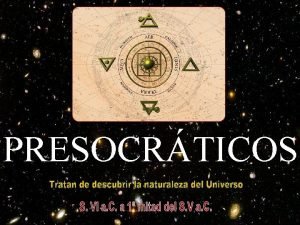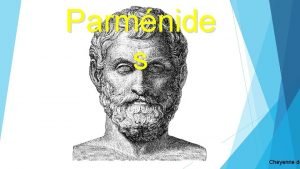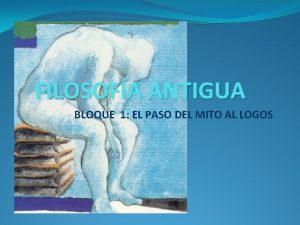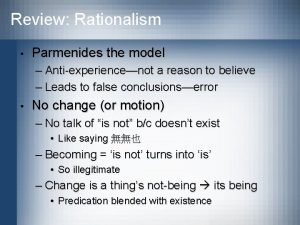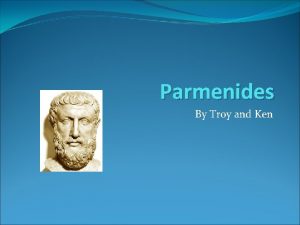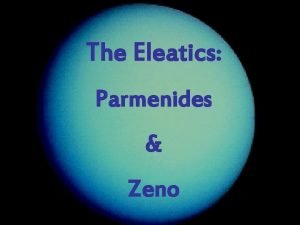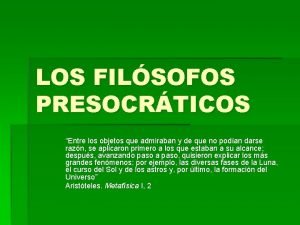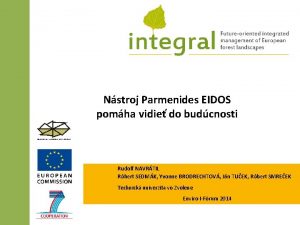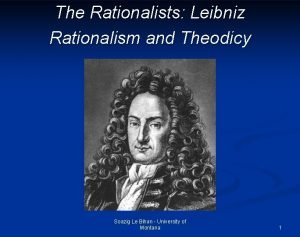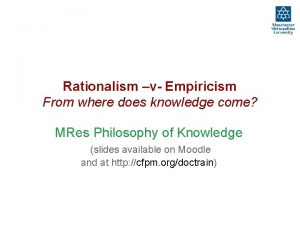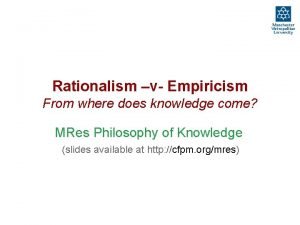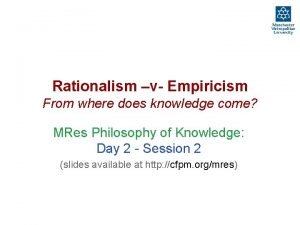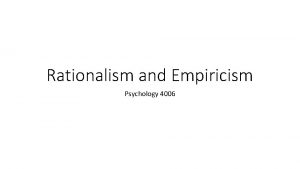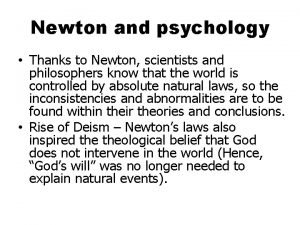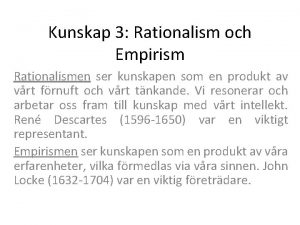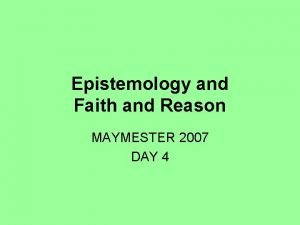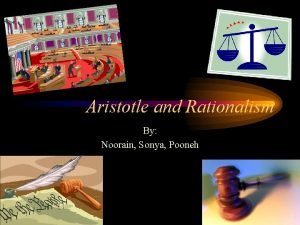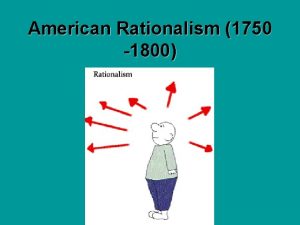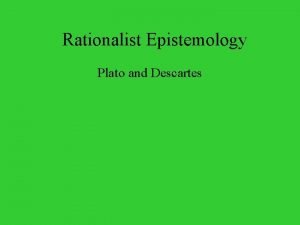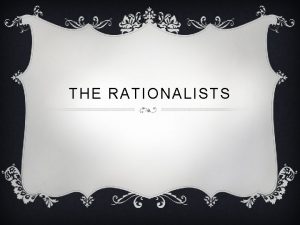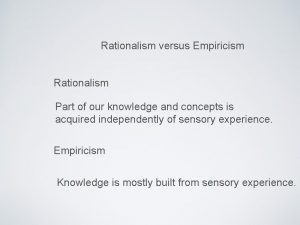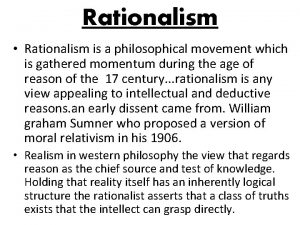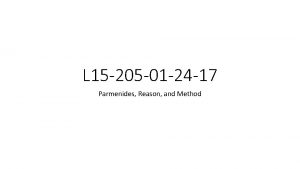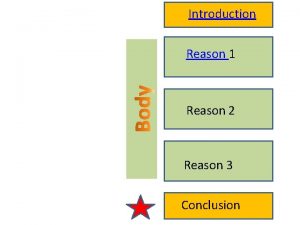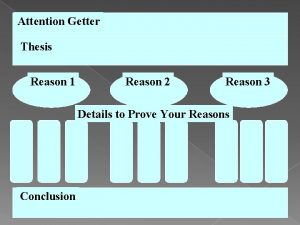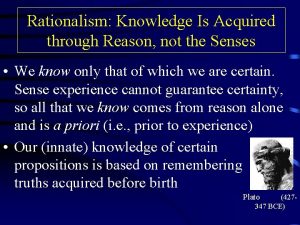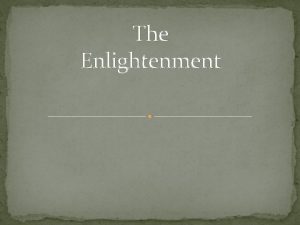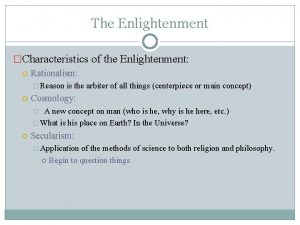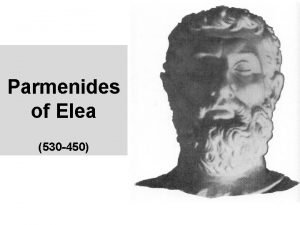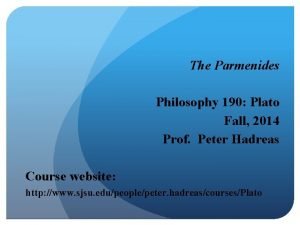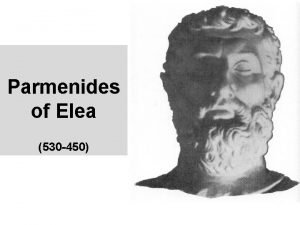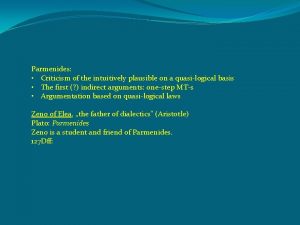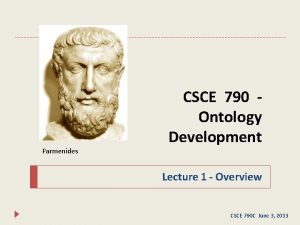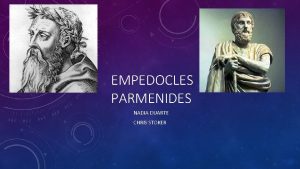Review Rationalism Parmenides the model Antiexperiencenot a reason





















- Slides: 21

Review: Rationalism • Parmenides the model – Anti-experience—not a reason to believe – Leads to false conclusions—error • No change (or motion) – No talk of “is not” b/c doesn’t exist • Like saying 無無也 – Becoming = ‘is not’ turns into ‘is’ • So illegitimate – Change is a thing’s not-being its being • Predication blended with existence

Classical Chinese contrast • Existence claim supported – Law of preservation of matter – Consistent with constant change (陰陽 yin-yang) – No ‘is’ verb--有 無you-wu exist-notexist and 也 • Other Greek Rationalists – Zeno and motion paradoxes – Pythagoras and concept of “proof” • Mathematical mysticism – Euclid: How to think—axioms + proof all truth • Role of definitions Socrates & ethics as theory • Examined life = theory of the healthy soul=ethics

Method of Good Thinking: Logic • Socratic Method – Doubt—but much more – Rationally motivated doubt • Still in the same structure—how proof motivates doubt • Logic as disciplined discourse – 'Argument': proof v quarrel sense – Proof consists of sentences • Premises and conclusion • Conversational implication – Conclusion “follows from” the premises – Needs explanation

Good/bad arguments (proofs) • • Valid: has a form such that if the premises were true, the conclusion would also be true Formal-symbolic representation – Venn diagram technique – Classic example: all C are B, all B are A, all C are A • Aristotle’s syllogism—now propositional logic – Modes Ponens If …then… – Model Tolens &Disjunctive syllogism

Questions 恭喜發財 Quiz for New Years? Formulate the problem of evil. Explain the advantage of a symbolic statement.

How to Prove Invalidity • Use the same form – With plainly true premises – And a false conclusion – Can not be a valid form • Distinguish from argument by analogy – Form of induction on a similarity – How do I know you have minds?

Soundness • Definition – Valid argument – True premises (all) • Conclusion of two definitions – Sound arguments have true conclusions • If an argument is valid and has true premises, then the conclusion is true. • A sound argument is a valid argument • A sound argument has true premises • Therefore a sound argument has a true conclusion • What if conclusion of valid form is false – Contradiction of “all” is “one or some” – At least one premise is false

Other Logics • Deductive v inductive – Guarantee by form v good reason for • Could be wrong—reasonable conclusion • Can’t use rule of the triad—conclusion false and still valid and premises true – Weakest to strongest • Analogy (weak form) one likeness • Classical induction: next one might change • Sampling, polling and statistics (with rigor) • Science (strong form) explain later – Inference to the best explanation

Moral Or Practical Reasoning • Uses the same model: called the practical syllogism – Belief-desire explanation of action in western thought • Belief + desire (sentence) entail intention/action • May substitute a norm/value/principle for “desire” – Desire the perception of value • To get a value (ought) conclusion, you need a value premise – You can't get an "ought" from an "is" – Abortion argument example

Deduction and Method: Crucial Move • • If conclusion false, then either invalid or premise false Key to scientific induction (v. Classical induction) – Laws and experimental setup predict a result • Premises are laws + observations/measurements • Conclusion is a prediction of experimental outcome – If prediction is false, one+ premise must be false • Usually the setup, but after repeated checking calls one of the laws into question • True confirm (false disconfirm)

Science: Detail • Premises and deductive conclusion – Laws: pure water freezes at 0 C. – This is water – This is below 0 C. – This will freeze • Doesn’t freeze—so? – Thermometer wrong, salt/alcohol mixed in water etc. – If all ruled out—reject the law • Laws, measurements, mathematics – Precision of prediction for science

Socratic Contradiction • Socratic method no experiment – Use argument to derive a contradiction – Must change a premise. Not necessarily the definition – Limits of Socratic (scientific) method: only exposes error not truth – Trial and error, creativity, insight, genius for premises

Example: The Problem of Evil • God is omnipotent, omniscient and all good creator of everything – Hence, there is no evil • Formal statement: A B C D. All good – "All things there are” – "things God made" – "things God wanted" – "good things“ • Evil = not good (definition) – There is no evil (everything is good/God’s will)

Theodicity • What is the alternative to no-evil? – God does not exist? Why does it not prove that? – Theodicity: possible solutions to the problem of evil • Limited god • Free will and necessary evil • Human and divine “good”

Back to Socrates: Virtue • Applies metaphysical analysis to ethics, truths are moral facts. – one (conventions many) – unchanging (vs. mores) – knowable (definitions) – rational (Socratic method) and – real. • Why care about those peculiar facts? – No man knowingly does evil

Weakness of Socratic Method • No answers—Socrates the skeptic – Dies ignorant – Famous lament—and student response • At least knows he doesn’t know • 知之為知之不知為不知是知也 • Deeper problem—many different consistent doctrines – Contradiction not easy to prove – Plato cheats!

Socrates and Plato Story • Death by legislature—bill of attainder – Plato’s hatred of democracy • Better for policy and choice of leaders • Not for judgment of guilt • Takes Socrates as a figure in dialogues – Source of our account of Socratic method – Classic example in Thrasymachus dialogue

Plato's Synthesis: • • Parmenides: the real world and ethical ideal blend Focus on search for definitions – Socrates origin or geometry • Result is that meaning/value = being – Really that being = meaning/value

Definitions: • Conform to rationalist presuppositions – One -- instances are many – Unchanging -- remain while that kind of thing – Knowable -- beliefs about objects (Heraclitus and Parmenides) – Rational -- Socratic method – Hence real • Idealism. Definitions (meanings: ideas) are real • "Things" are not

Rules for Definitions • • Implicit in Plato's dialogues with Socrates No lists. What is common to all instances No vagueness. Strong No circularity (or mere synonyms) – Definition so usable in arguments • No hearsay -- test by expert knowledge – Real v. Nominal definitions • Test by reason. Socratic method

Conclusion: The Forms • • Intellectual forms correspond to definitions (meanings) Forms provide a unified answer to questions in all fields of philosophy – Metaphysics: what is real. Real definitions v. Nominal – Epistemology: what is knowable. Like soul/mind-intellectual – Logic: the thinkable objects (not laws of thought but semantics) – Ethics: no man knowingly does evil. Health of the soul
 Anaxagoras arje
Anaxagoras arje Parmenides biografia
Parmenides biografia Arje de parmenides
Arje de parmenides Parmenides beliefs
Parmenides beliefs Parmenides influenced
Parmenides influenced Parmenides zeno
Parmenides zeno Tales de mileto
Tales de mileto Parmenides eidos
Parmenides eidos Gottfried leibniz racionalismo
Gottfried leibniz racionalismo Example of rationalism
Example of rationalism Rationalism v empiricism
Rationalism v empiricism Rationalism v empiricism
Rationalism v empiricism Rationalism psychology
Rationalism psychology Rationalism psychology
Rationalism psychology Rationalists vs empiricists
Rationalists vs empiricists Rationalism empirism
Rationalism empirism Advantages of empiricism
Advantages of empiricism Rationalist
Rationalist Rationalism aristotle
Rationalism aristotle American rationalism
American rationalism Rationalism literature
Rationalism literature Plato rationalism
Plato rationalism
